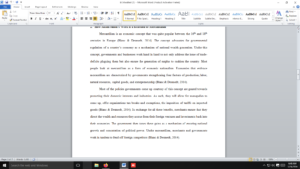Eighteenth-century political economist
Adam Smith, a very influential eighteenth-century political economist, wrote, “By pursuing his own interest, he frequently promotes that of the society more effectually than when he really intends to promote it” (cited in Stiglitz & Rosengard, 2015, p. 62). Considering the quotation, in 1,250-1,500 words, address the following questions.
- Describe what Smith meant by the “invisible hand.” How exactly does it function?
- Describe how Smith’s work is a reaction to mercantilism, which dominated the seventeenth and eighteenth centuries. As a point of departure, define mercantilism.
- Discuss if all 19th-century thinkers agree with Smith. How did, for instance, Karl Marx view the doctrine of laissez-faire? What were the inevitable consequences of such an economic system?
- Discuss the influences of Smith and his critics, like Marx, reflected in the mixed economy of the United States today.
Use three to five scholarly resources to support your explanations.
Prepare this assignment according to the guidelines found in the APA Style Guide.
Requirements: 1250-1500 Words
Answer preview
Mercantilism is an economic concept that was quite popular between the 16th and 18th centuries in Europe (Blanc & Desmedt, 2014). The concept advocates for governmental regulation of a country’s economy as a mechanism of national wealth generation. Under this concept, governments and businesses work hand in hand to not only address the issue of trade-deficits plaguing them but also ensure the generation of surplus to cushion the country. Most people look at mercantilism as a form of economic nationalism. Economies that embrace mercantilism are characterized by governments strengthening four factors of production; labor, natural resources, capital goods, and entrepreneurship (Blanc & Desmedt, 2014).
[1430 Words]

Eighteenth-century political economist

